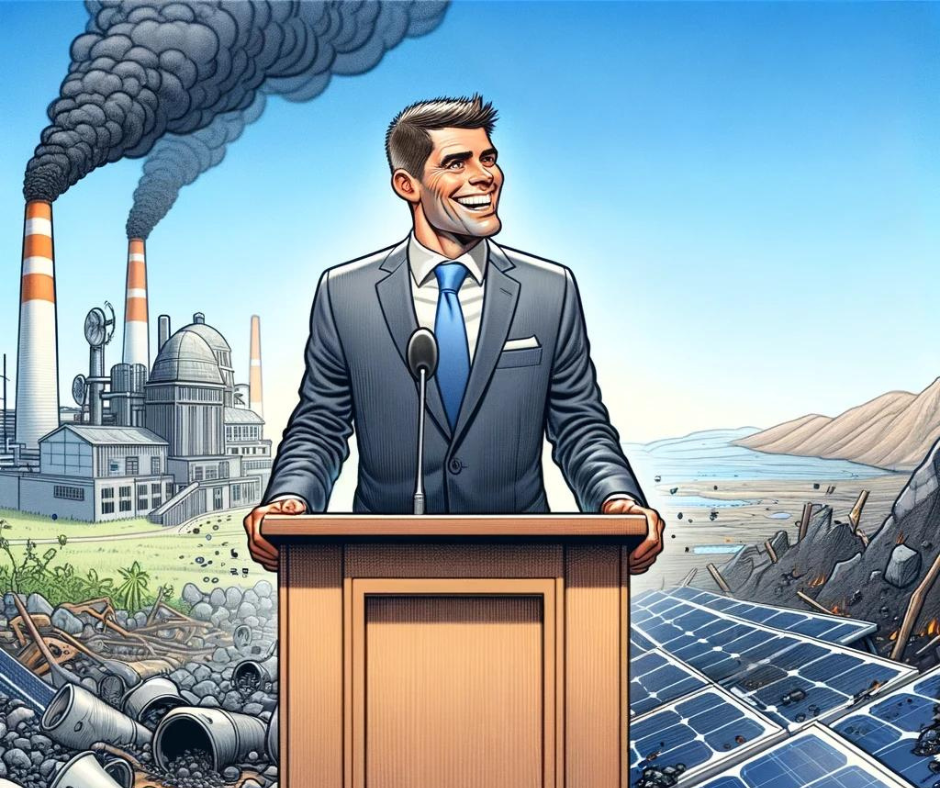Why Some Embrace Environmental "Fake News"
Governor Inslee calls it the “cataclysm that is coming.” Environmental groups call it the most important issue we face. They are talking about stopping climate change by cutting CO2 emissions.
Given the striking language, demanding that politicians deliver results on such a vital issue would seem to be of paramount importance. If the state and cities are not reducing carbon emissions shouldn’t environmental groups demand changes to face this “existential threat”?
That, however, is not happening. According to Governor Inslee’s own data, Washington is not meeting its own climate goals. Despite that, the Washington Conservation Voters praised Inslee, thanking the Governor, “for your consistent leadership, both here in Washington and beyond, on climate change.”
What accounts for the chasm between the publicly-expressed interest of environmental activists to reduce CO2 emissions and the complete lack of interest in checking to see if elected officials are achieving that goal? Why do they so glibly ignore data they need to make environmental progress?
For anyone who has seen facts routinely dismissed as “fake news,” this pattern is familiar. People simply dismiss the divergence between their stated, and strongly held, beliefs, and their real-world actions. Instead, people choose a comfortable blindness by ignoring the tension-inducing gap between beliefs they hold and facts that contradict those beliefs.
This effect would not be surprising to marketing researchers Kristine Ehrich and Julie Irwin. They studied the purchasing behavior of students who expressed strong environmental opinions – in this case about furniture made with sustainable wood. They found students avoided gathering information that would help them choose environmentally friendly products. Their 2005 study, “Willful Ignorance in the Request for Product Information,” notes that people “do not ask for ethical attribute information that may make them uncomfortable.”
Put another way, it would not surprise the researchers that environmental activists spend more time focusing on public statements of support from politicians they endorse, like Jay Inslee, than on their real-world failures. Environmental groups, like consumers, “are not particularly willing to seek ethical attribute information when the knowledge of this information has potentially negative emotional consequences.” If you’ve already made up your mind, what is the point of looking for evidence that you might be wrong?
If we care about the environment, however, we have every reason to make sure the environment itself is benefitting, not just our own sense of self-worth. Environmental groups do not do that. Willful ignorance is the order of the day when their political support has been at odds with environmental results.
This is not unique to the environmental left. The phrase “fake news,” repeated frequently by the President, offers social license for people to dismiss nagging bits of data that raise uncomfortable questions. Too often, my fellow-travelers on the right dismiss real environmental issues, like threats to fisheries or water quality, because they fear government interventionist policies and restrictions on personal freedom.
Indeed, I frequently discourage conservatives from calling climate change a “hoax.” It is certainly exaggerated in ways that are often wholly unscientific, but it is pretty clear that CO2 traps heat that, over time, warms the planet.
The trend of crying “fake news” to employ willful ignorance is a growing threat to finding effective environmental solutions.
After a study I co-authored with a PhD statistician demonstrated serious errors in research by a biologist at Washington State University, he simply dismissed our fact-based findings as “fake news.” For those who wanted to agree with him, that signal was all that was necessary to invoke the defense mechanism of willful ignorance.
The environment, personal freedom, and prosperity, however, will only benefit if we consider new information with an open mind. Ignoring overfishing until it is too late, invites oppressive government intervention. Writing congratulatory letters to political leaders who have failed utterly to help the environment leads people to question the sincerity of the cause, not to mention undermines efforts that might deliver cleaner air.
A clear-eyed focus on facts and science is the best way to help protect the environment and the planet, even if it might bruise our egos once in a while.




